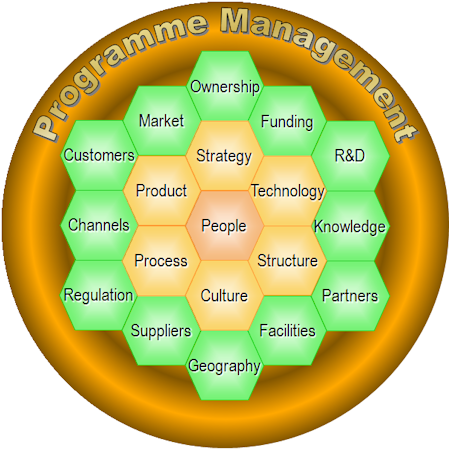 A programme is a set of related projects
which collectively deliver an overall change for the business.
Most significant changes involve many aspects of the business.
A programme is a set of related projects
which collectively deliver an overall change for the business.
Most significant changes involve many aspects of the business.
Organisations often fail to recognise the importance of managing a business change programme as an overall strategic initiative. It is common to apply project management discipline to specific components of the change - particularly the IT systems. Even greater focus and rigour should be applied to achieving the overall business objective.
By definition, a programme will involve several parts of an organisation. Participants need to be shepherded together to deliver the results. This means that every strategic change programme should be directly owned and controlled from board level. Programmes also deserve and require full-time attention from a senior manager - someone who can command action from all parts of the business.
 A programme is a set of related projects
which collectively deliver an overall change for the business.
Most significant changes involve many aspects of the business.
A programme is a set of related projects
which collectively deliver an overall change for the business.
Most significant changes involve many aspects of the business.
It is a common misunderstanding to think of change programmes as a technology issue. Certainly, technology is normally involved in the change and the IT staff have well-developed methods and skills for managing technology projects. Technology is, however, only one of many aspects of the overall change.
There will be two levels of management focus. At the programme level, the programme management team are focused on driving change across all relevant parts of the organisation. Below that, each individual initiative will have its own leadership, focused on delivering a specific component of the solution.
The characteristics of these two levels can be strikingly different. Programme managers often need to be politically astute ambassadors, negotiating with the leadership team in different parts of the business to bring about the overall corporate goal. They will often be dealing with imprecise, evolving concepts. They will need to establish the business case and persuade others of its merit. They will be visionaries who understand that there should be a better way of conducting business.
Contrast this to the character of a project manger. The project manager will doggedly strive to deliver a specified overall deliverable for the business. They will focus intensely on their target, getting involved in the detailed issues. They deliver the goods - but rarely step back to consider the bigger picture.
Some aspects of programme management are similar to the management of projects, albeit conducted at a higher, more strategic level. For example, a programme manager will address risks and issues - but focusing on impacts for the overall initiative and the best interests of the organisation as a whole. A project manager performing the same tasks would, in contrast, address risks and issues to delivering the specific defined deliverables.
Initially a programme will be ill defined - just a set of ideas that merit exploration and testing. The concept will evolve until a change programme can be defined, along with its associated business case and blueprint for the overall change.
Before work starts on individual deliverables, the key components need to be defined and agreed: things such as the vision, objectives, scope, architecture, approach, resourcing, responsibilities and dependencies. Attention should be given to the human change aspects of the change - usually a major consideration in strategic change programmes. These building blocks form the framework within which individual projects can be conducted.
Only the strategic leadership of the initiative is normally conducted directly by the programme management. Specific changes are usually achieved by the definition of a number of projects which collectively deliver the overall business benefit. These are defined and instigated by the programme team, but will have their own project management teams.
Of course, programme management does not stop with the launch of the individual projects. The programme will inevitably evolve over time - even within the timeframe of the scheduled projects. The programme management team will continuously focus on delivering optimum benefit for the organisation - always ready to make further improvements or change direction to meet the best interests of the business.
Programme management also provides oversight of the individual projects:
Programme management is a specialist discipline in its own right. It is not a routine line management task, nor is it a task for an IT project manager. It merits top-level direction and an experienced programme management team.
Recognising the required skills and sponsorship is essential. The team must have the ability, positioning, sponsorship and support to drive the overall business change. They will require sound business competence, diplomatic skills, the ability to comprehend a wide range of disciplines and functions within the organisation, and a deep understanding of programme management techniques.
Further Reading |
 |
|
ePMbook - Programme Management Overview ePMbook - Programmes and Projects |
|
Copyright © Simon Wallace, 1999 - 2018 |